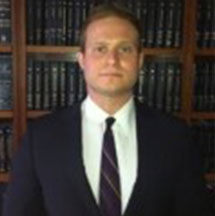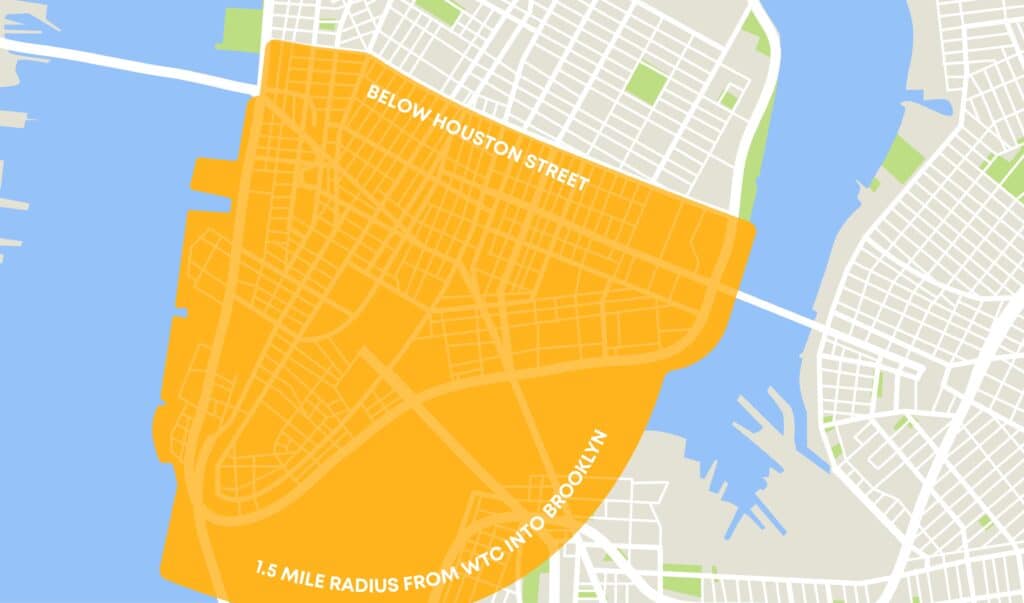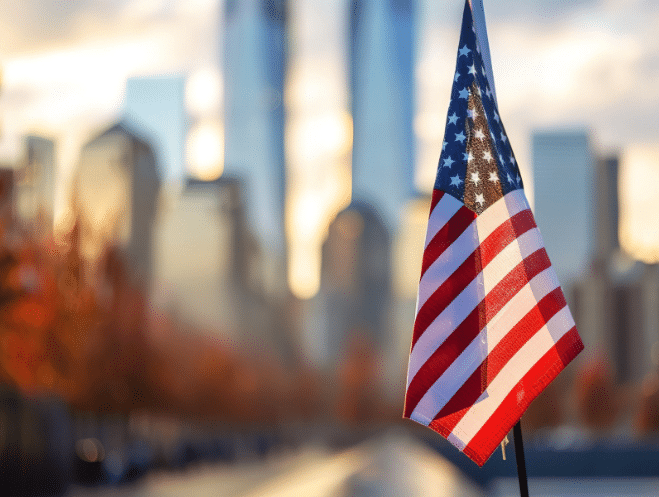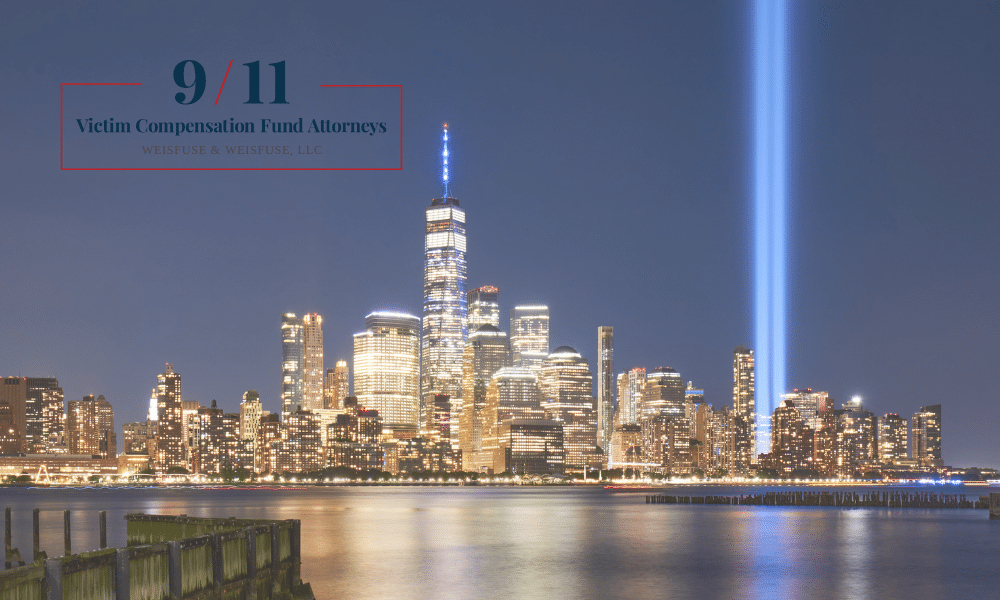
In March 2017, 1,500 survivors of the September 11 attacks, along with 850 family members of victims, filed a 28-page lawsuit against the Kingdom of Saudi Arabia under JASTA litigation—the Justice Against Sponsors of Terrorism Act. In this suit, the victims and families alleged that the Saudi government was complicit since it knew that some of their officials were Al Qaeda sympathizers and operatives, and furthermore “knowingly provided material support and resources to the al Qaeda terrorist organization and facilitating the September 11th Attacks.”
For those victims and families of those who died in the attacks, a common question is whether one can still seek compensation from the September 11th Victim Compensation Fund (VCF) for 9/11-related injuries and illnesses—especially those caused by the toxic dust cloud from the World Trade Center collapse? According to the September 11th Victim Compensation Fund, “Yes, if you participate in a lawsuit under JASTA, you can still file a VCF claim. Any compensation awarded by the court in the lawsuit or obtained in a settlement of litigation will be treated as an offset and deducted from your VCF award.”
What is JASTA?
The intent of JASTA is to give families and survivors of the September 11 attacks an avenue to pursue justice in American courts against Saudi Arabia, for what they believe is its connection to the terrorist attack. Specifically, the objective is to “provide civil litigants with the broadest possible basis … to seek relief against persons, entities, and foreign countries, wherever acting and wherever they may be found, that have provided material support, directly or indirectly, to foreign organizations or persons that engage in terrorist activities against the United States.
Though the 9/11 Commission Report “found no evidence that the Saudi government as an institution or senior Saudi officials individually funded the organization,” it also stated that “Saudi Arabia has long been considered the primary source of Al Qaeda funding.” In general, claims were made against “The Kingdom of Saudi Arabia, several Saudi princes, a Saudi banker, and a Saudi charity. Plaintiffs argued that these Saudi defendants played a ‘critical role’ in the September 11 attacks by giving money to Muslim groups, which in turn funded Al Qaeda.”
More specifically, in the lawsuit it is alleged that the Kingdom of Saudi Arabia:
- Provided support and resources to Al Qaeda that facilitated the 9/11 attacks on the United States
- Funded and provided support to Al Qaeda by furnishing false passports, transferring money, assisting in the transfer of weapons and equipment across international borders, and other assistance critical in carrying out the 9/11 attacks
- Provided financial support and laundered money to fund Al Qaeda’s terrorist activities
- Funded Al Qaeda terrorist camps in Afghanistan, which were also used to train and indoctrinate the 9/11 hijackers
In 2008, the U.S. Court of Appeals for the Second Circuit dismissed all claims against the Saudi defendants, holding that the U.S. Courts lacked jurisdiction. First introduced in 2009 and finally enacted into law in 2016, JASTA effectively removed the strictures for the 9/11 victims that existed under both the Foreign Sovereign Immunities Act (FSIA) of 1976 and the Antiterrorism and Effective Death Penalty Act (AEDPA) of 1996. It’s passing also marked the first override of a veto by President Barack Obama, who voiced concern that the bill could end up putting the United States at risk of being similarly prosecuted in foreign courts by undermining a long-standing tradition of sovereign immunity.
What is happening with the JASTA lawsuit?
In addition to the 2,350 original plaintiffs, there is an ongoing mass lawsuit filed on behalf of 100,000 victims and their families. JASTA eliminated the FISA requirement of “state-sponsored terrorism” as a basis for a lawsuit, as well allowing claims based on aiding-and-abetting and conspiracy claims. As such, the lawsuit against the Saudi government can move forward if it can be shown that:
- The Saudi government knowingly participated in a conspiracy to commit an act of terrorism against U.S. citizens
- The Saudi government had general knowledge of the planned attack; thereby aiding and abetting the terrorists
One of the more chilling effects of the JASTA lawsuit, as reported by the Washington Post, include allegations such as a witness being “approached in person and directly threatened by Saudi government officials…or their employees and agents.”
What is the difference between JASTA and the 9/11 VCF?
Whereas JASTA is a lawsuit primarily against the Kingdom of Saudi Arabia, the September 11th Victim Compensation Fund is just that: a fund authorized by Congress to provide financial compensation “to individuals (or a personal representative of a deceased individual) who were present at the World Trade Center or the surrounding New York City Exposure Zone; the Pentagon crash site; and the Shanksville, Pennsylvania crash site, at some point between September 11, 2001, and May 30, 2002, and who have since been diagnosed with a 9/11-related illness.”
Can a plaintiff in a JASTA lawsuit still file a 9/11 VCF claim?
Once again, yes. The VCF does not prohibit JASTA litigants from filing a VCF claim. Any victim filing a claim, or a personal representative filing a wrongful death lawsuit on behalf of a deceased victim’s heirs, must still adhere to VCF policies and procedures.
However, those who have received any settlement or award from the lawsuit will be subject to a collateral offset. A collateral offset is “compensation from other sources that a claimant received or became entitled to receive as a result of an eligible injury and must subtracted by the (VCF) award.” This would include any award from the JASTA litigation. The law requires that claimants report collateral source payments that would affect compensation that they would receive from the VCF.
Weisfuse & Weisfuse will help you navigate the 9/11 VCF Process
Victims or personal representatives who are filing a September 11th Victim Compensation Fund claim—particularly those who are involved in JASTA litigation or may have other collateral offsets that may include life insurance, pension funds, death benefits programs, or payments by federal, state, or local governments related to the 9/11 terrorist-related aircraft crashes—may benefit from the guidance of our experienced VCF fund attorneys. To schedule a free consultation to discuss your situation, please contact us online or call us at 212-983-3000

About Jason Weisfuse –
9/11 Victim Compensation Fund Attorney
About Jason Weisfuse –
9/11 Victim Compensation Fund Attorney
Jason E. Weisfuse is a seasoned 9/11 cancer attorney and managing partner at Weisfuse & Weisfuse, LLC, a New York City-based law firm dedicated to representing individuals affected by the September 11th attacks. Since the establishment of the September 11th Victim Compensation Fund (VCF), Jason has been instrumental in assisting first responders, survivors, and families in securing the compensation and medical benefits they deserve.
With a Juris Doctor from New York Law School (2009), Jason brings extensive experience regarding the 9/11 Victim Compensation Fund to his practice. His deep understanding of the VCF and the World Trade Center Health Program (WTCHP) has enabled him to navigate complex claims processes effectively, resulting in substantial awards for his clients.
Jason’s commitment to the victims in the 9/11 community is evident through his active involvement in professional organizations such as the New York State Trial Lawyers Association and the American Association for Justice. He has also contributed to legal discourse with publications in the New York Law Journal, reflecting his dedication to legal excellence and advocacy.
At Weisfuse & Weisfuse, LLC, Jason continues to provide compassionate and knowledgeable representation, ensuring that those affected by 9/11 receive the support and compensation they are entitled to.







